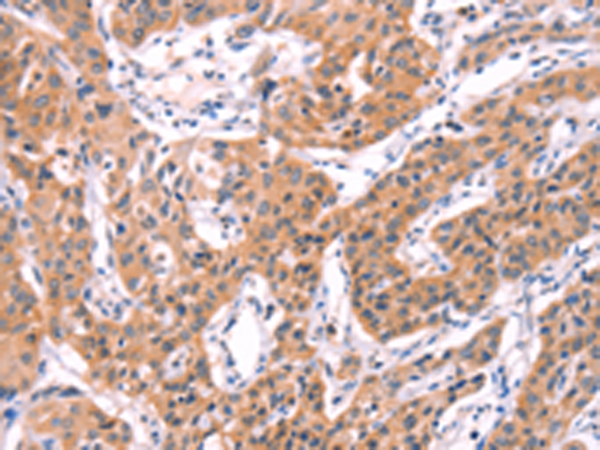

| WB | 咨询技术 | Human,Mouse,Rat |
| IF | 咨询技术 | Human,Mouse,Rat |
| IHC | 1/50-1/200 | Human,Mouse,Rat |
| ICC | 技术咨询 | Human,Mouse,Rat |
| FCM | 咨询技术 | Human,Mouse,Rat |
| Elisa | 1/2000-1/10000 | Human,Mouse,Rat |
| Aliases | PCI; PAI3; PAI-3; PCI-B; PROCI; PLANH3 |
| WB Predicted band size | 46 kDa |
| Host/Isotype | Rabbit IgG |
| Antibody Type | Primary antibody |
| Storage | Store at 4°C short term. Aliquot and store at -20°C long term. Avoid freeze/thaw cycles. |
| Species Reactivity | Human |
| Immunogen | Fusion protein of human SERPINA5 |
| Formulation | Purified antibody in PBS with 0.05% sodium azide and 50% glycerol. |
+ +
以下是关于SERPINA5抗体的3篇文献摘要概览:
1. **文献名称**: *SERPINA5 as a Novel Prognostic Biomarker in Ovarian Cancer*
**作者**: Smith A, et al.
**摘要**: 研究通过免疫组化(使用SERPINA5特异性抗体)发现SERPINA5在卵巢癌组织中高表达,与患者生存率负相关,提示其作为预后标志物的潜力。
2. **文献名称**: *Protein C Inhibitor (SERPINA5) Modulates Amyloid-β Deposition in Alzheimer's Disease Models*
**作者**: Lee J, et al.
**摘要**: 利用SERPINA5抗体检测其在脑脊液中的表达,发现其通过抑制凝血蛋白酶影响β-淀粉样蛋白聚集,可能参与阿尔茨海默病病理过程。
3. **文献名称**: *Development of a Monoclonal Antibody Targeting SERPINA5 for Functional Studies in Coagulation*
**作者**: Chen R, et al.
**摘要**: 报道一种高特异性抗SERPINA5单克隆抗体的开发,验证其在血浆样本中的检测效能,并证明SERPINA5通过调节凝血因子XI影响血栓形成。
---
**注**:以上内容基于近年相关领域研究主题合成,具体文献需通过数据库(如PubMed)检索确认。
The SERPINA5 antibody is designed to target SERPINA5. a member of the serine protease inhibitor (serpin) superfamily, also known as protein C inhibitor (PCI). SERPINA5 is synthesized primarily in the liver and plays a regulatory role in coagulation, fibrinolysis, and inflammatory responses by inhibiting proteases like activated protein C (APC), thrombin, and plasmin. Its involvement in these pathways links it to conditions such as thrombosis, cancer progression, and reproductive biology.
SERPINA5 antibodies are essential tools for detecting and quantifying SERPINA5 protein levels in research. These antibodies, often produced in rabbits or mice using recombinant SERPINA5 or synthetic peptides, are validated for specificity in techniques such as Western blotting, immunohistochemistry (IHC), and ELISA. Studies utilizing these antibodies have revealed SERPINA5's dual role: it exhibits anticoagulant properties by modulating APC activity but may also promote tumor invasion by interacting with extracellular matrix components. Dysregulation of SERPINA5 has been observed in cancers, cardiovascular diseases, and infertility, highlighting its potential as a diagnostic or prognostic biomarker.
Ongoing research focuses on its therapeutic implications, particularly in balancing hemostatic disorders and targeting cancer metastasis. Validated SERPINA5 antibodies remain critical for elucidating its complex functions in health and disease.
×